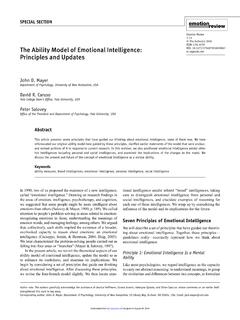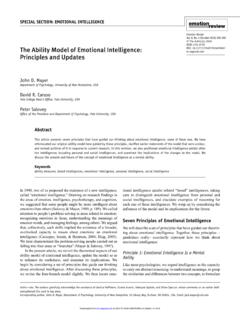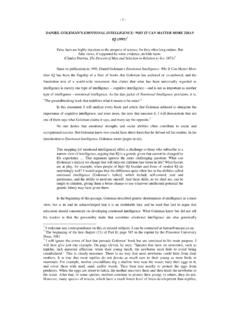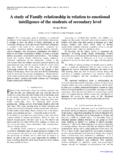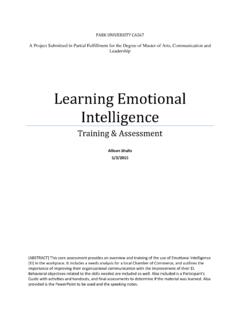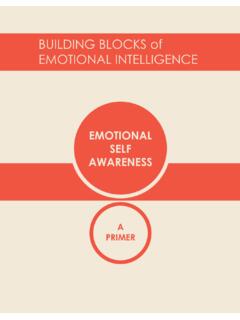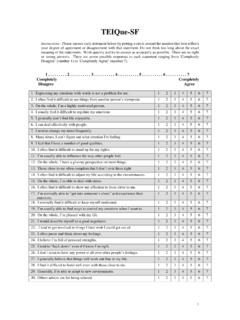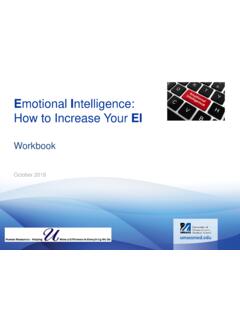Transcription of What Is Emotional Intelligence? Contents
1 What Is Emotional intelligence ? Contents What Is Emotional intelligence ? .. 1 Introduction to the Concept .. 2 intelligence .. 3 The Four Branch Model of Emotional intelligence .. 3 Introduction .. 3 What Are the Four Branches? .. 4 1. Perceiving Emotion .. 4 2. Using Emotions to Facilitate Thought .. 4 3. Understanding Emotions .. 4 4. Managing Emotions .. 4 Commonly Asked Questions about the Four-Branch Models .. 5 What, Specifically, Does Branch Refer to? .. 5 Where Can I Find the Clearest Statements of the Four-Branch Model?
2 5 What Was In the First, Four-Branch Model of Emotional intelligence ? .. 5 The 2016 Revision: The Contemporary Version of the Branches .. 5 Relation of the Branch Models of Emotional intelligence to Journalistic Coverage of Emotional intelligence .. 6 How Does This Model Compare to Other Approaches to Emotional intelligence ? .. 6 On Mixed Models of Emotional intelligence .. 6 Advantages of the Ability Definition Employed on this Site .. 7 Who Among Us Is Emotionally Intelligent? .. 7 Who Is Emotionally Intelligent and Does it Matter?
3 7 Nonetheless, EI Is Important .. 8 How Did the Term Emotional intelligence Take on so Many Different Meanings? .. 9 Introduction .. 9 Synopsis .. 9 Postscript .. 10 Emotional intelligence as a Part of Personality .. 10 Why Study Emotional intelligence Together with Personality Psychology? .. 10 What Does Emotional intelligence Predict? .. 10 What do Personality Traits Predict? .. 10 What Does EI Predict? .. 11 A Focus on Emotional intelligence .. 11 Glossary of Terms Useful Here .. 12 General Psychological Terms .. 12 Personality trait.
4 12 Concepts Related to Emotional intelligence .. 12 Mixed models of Emotional intelligence : .. 13 Empathy: .. 13 Emotional self-efficacy: .. 13 Socio- Emotional effectiveness or competence: .. 13 Socio-emotionally effective behavior: .. 13 Other Terms .. 13 Connecting Emotion, Motivation, and intelligence .. 13 Interest: .. 13 Curiosity:.. 13 Intrinsic Intellectuality: .. 13 Reference(s) Cited on this Web Page .. 13 Introduction to the Concept There are many possible definitions of Emotional intelligence , and many definitions can be found on the Internet.
5 Many of these definitions stem from the popularizations of Emotional intelligence found in the popular press and in popular A clear and scientifically useful definition of Emotional intelligence , however, is recognizeable because it takes the terms emotion and intelligence seriously. That is, the meaning of Emotional intelligence has something specific to do with the intelligent intersection of the emotions and thoughts. For example: Emotional intelligence represents an ability to validly reason with emotions and to use emotions to enhance thought.
6 Earlier, we had written that: We define EI as the capacity to reason about emotions, and of emotions to enhance thinking. It includes the abilities to accurately perceive emotions, to access and generate emotions so as to assist thought, to understand emotions and Emotional knowledge, and to reflectively regulate emotions so as to promote Emotional and intellectual growth (Mayer, Salovey & Caruso, 2004, p. 197). Here is another definition my colleagues and I have employed: Emotional intelligence refers to an ability to recognize the meanings of emotion and their relationships, and to reason and problem-solve on the basis of them.
7 Emotional intelligence is involved in the capacity to perceive emotions, assimilate emotion-related feelings, understand the information of those emotions, and manage them (Mayer, Caruso & Salovey, 1999, p. 267). In this model, emotion refers to a feeling state (including physiological responses and cognitions) that conveys information about relationships. For example, happiness is a feeling state that also conveys information about relationships -- typically, that one would like to join with others. Similarly, fear is a feeling state that corresponds to a relationship -- the urge to flee others intelligence In this model, intelligence refers to the capacity to reason validly about information.
8 This use of the term Emotional intelligence in this fashion is consistent with scientific literature in the fields of intelligence , personality psychology, and emotions. For example: Verbal intelligence concerns the mental ability to reason with and about verbal information, and of verbal knowledge to enhance thought. Spatial intelligence concerns the mental ability to reason with and about spatial information ( , the shape of objects and their orientation in space), and of spatial knowledge to enhance thought..and so on. For more information about our specific conception of Emotional intelligence the four-branch ability model see the web page on the Four Branch Model of Emotional intelligence .
9 For a comparison of this model to the more popular definitions, see How Does This Model Compare to Other The Four Branch Model of Emotional intelligence Introduction The four-branch model of Emotional intelligence describes four areas of capacities or skills that collectively describe many of areas of Emotional intelligence (Mayer & Salovey, 1997). More specifically, this model defines Emotional intelligence as involving the abilities to: accurately perceive emotions in oneself and others use emotions to facilitate thinking understand Emotional meanings, and manage emotions By the late 1980's, psychologists, evolutionary biologists, psychiatrists, computer scientists, and others, had identified a number of human capacities involved in identifying and understanding emotions.
10 These human capacities involving Emotional information processing had been examined in scores of research articles. One means of organizing the many research contributions was to divide them into different areas according to the nature of the abilities they examined. In 1990, Salovey and I proposed that these abilities made up a unitary Emotional intelligence . We further suggested that Emotional intelligence (and the research that pertained to it) could be divided into three broad areas (and further sub-areas), as shown in Figure 1 of Salovey & Mayer (1990).
